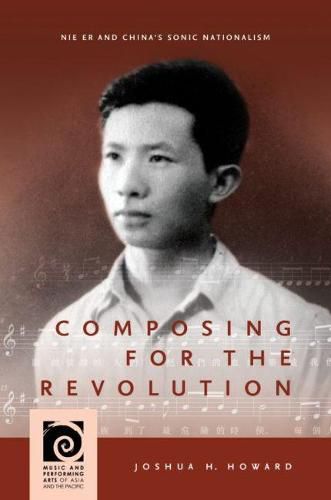Readings Newsletter
Become a Readings Member to make your shopping experience even easier.
Sign in or sign up for free!
You’re not far away from qualifying for FREE standard shipping within Australia
You’ve qualified for FREE standard shipping within Australia
The cart is loading…






In Composing for the Revolution: Nie Er and China’s Sonic Nationalism, Joshua Howard explores the role the songwriter Nie Er played in the 1930s proletarian arts movement and the process by which he became a nationalist icon. Composed only months before his untimely death in 1935, Nie Er’s last song, the March of the Volunteers, captured the rising anti-Japanese sentiment and was selected as China’s national anthem with the establishment of the People’s Republic. Nie was quickly canonized after his death and later recast into the People’s Musician during the 1950s, effectively becoming a national monument.
Howard engages two historical paradigms that have dominated the study of twentieth-century China: revolution and modernity. He argues that Nie Er, active in the leftist artistic community and critical of capitalism, availed himself of media technology, especially the emerging sound cinema, to create a modern, revolutionary, and nationalist music. This thesis stands as a powerful corrective to a growing literature on the construction of a Chinese modernity, which has privileged the mass consumer culture of Shanghai and consciously sought to displace the focus on China’s revolutionary experience.
Composing for the Revolution also provides insight into understudied aspects of China’s nationalism-its sonic and musical dimensions. Howard’s analyses highlights Nie’s extensive writings on the political function of music, examination of the musical techniques and lyrics of compositions within the context of left-wing cinema, and also the transmission of his songs through film, social movements, and commemoration. Nie Er shared multiple and overlapping identities based on regionalism, nationalism, and left-wing internationalism. His march songs, inspired by Soviet mass songs, combined Western musical structure and aesthetic with elements of Chinese folk music. The songs’ ideological message promoted class nationalism, but his March of the Volunteers elevated his music to a universal status thereby transcending the nation.
Traversing the life and legacy of Nie Er, Howard offers readers a profound insight into the meanings of nationalism and memory in contemporary China. Composing for the Revolution underscores the value of careful reading of sources and the author’s willingness to approach a subject from multiple perspectives.
$9.00 standard shipping within Australia
FREE standard shipping within Australia for orders over $100.00
Express & International shipping calculated at checkout
In Composing for the Revolution: Nie Er and China’s Sonic Nationalism, Joshua Howard explores the role the songwriter Nie Er played in the 1930s proletarian arts movement and the process by which he became a nationalist icon. Composed only months before his untimely death in 1935, Nie Er’s last song, the March of the Volunteers, captured the rising anti-Japanese sentiment and was selected as China’s national anthem with the establishment of the People’s Republic. Nie was quickly canonized after his death and later recast into the People’s Musician during the 1950s, effectively becoming a national monument.
Howard engages two historical paradigms that have dominated the study of twentieth-century China: revolution and modernity. He argues that Nie Er, active in the leftist artistic community and critical of capitalism, availed himself of media technology, especially the emerging sound cinema, to create a modern, revolutionary, and nationalist music. This thesis stands as a powerful corrective to a growing literature on the construction of a Chinese modernity, which has privileged the mass consumer culture of Shanghai and consciously sought to displace the focus on China’s revolutionary experience.
Composing for the Revolution also provides insight into understudied aspects of China’s nationalism-its sonic and musical dimensions. Howard’s analyses highlights Nie’s extensive writings on the political function of music, examination of the musical techniques and lyrics of compositions within the context of left-wing cinema, and also the transmission of his songs through film, social movements, and commemoration. Nie Er shared multiple and overlapping identities based on regionalism, nationalism, and left-wing internationalism. His march songs, inspired by Soviet mass songs, combined Western musical structure and aesthetic with elements of Chinese folk music. The songs’ ideological message promoted class nationalism, but his March of the Volunteers elevated his music to a universal status thereby transcending the nation.
Traversing the life and legacy of Nie Er, Howard offers readers a profound insight into the meanings of nationalism and memory in contemporary China. Composing for the Revolution underscores the value of careful reading of sources and the author’s willingness to approach a subject from multiple perspectives.